 Libri di William Geroux su Unilibro.it) Libri di William Geroux su Unilibro.it)
|
|
2022 |
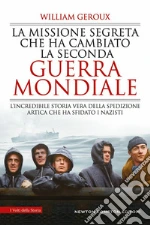 Title :
La missione segreta che ha cambiato la Seconda guerra mondiale. L'incredibile storia vera della spedizione artica che ha sfidato i nazisti
Title :
La missione segreta che ha cambiato la Seconda guerra mondiale. L'incredibile storia vera della spedizione artica che ha sfidato i nazistiAuthor: Geroux William Publisher: Newton Compton Editori Nell'estate del 1942 la vittoria degli alleati era tutt'altro che scontata. Così Roosevelt e Churchill organizzarono dei convogli artici, scortati dalle unità alleate, per rifornire la Russia, allo stremo. I convogli erano composti da marinai che avevano lavorato su navi mercantili, uomini inadatti al servizio militare, peraltro a bordo di vecchie imbarcazioni minacciate da iceberg, bombardieri e sottomarini. Il 17° convoglio (PQ-17) aveva appena iniziato ad attraversare l'Atlantico del Nord, quando Hitler minacciò di schierare la temibile corazzata Tirpitz per annientarlo. Temendo la perdita di insostituibili navi da guerra, l'ammiragliato britannico ordinò alla flotta militare di disperdersi e lasciare il convoglio senza difesa. Churchill lo definì 'l'episodio più triste di tutta la guerra', ma quando i tedeschi iniziarono a dare la caccia alle navi del convoglio via mare e via cielo, quattro di esse riuscirono a salvarsi, mimetizzandosi nel ghiaccio grazie a vernice bianca e lenzuoli. Nascondendosi alla vista del nemico, proseguirono verso il porto sovietico di Arcangelo, riuscendo così a far pervenire gli indispensabili approvvigionamenti alla Russia. € 12,90
Scontato: € 12,26
|
|
|
2019 |
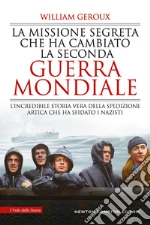 Title :
La missione segreta che ha cambiato la Seconda guerra mondiale. L'incredibile storia vera della spedizione artica che ha sfidato i nazisti
Title :
La missione segreta che ha cambiato la Seconda guerra mondiale. L'incredibile storia vera della spedizione artica che ha sfidato i nazistiAuthor: Geroux William Publisher: Newton Compton Nell'estate del 1942 la vittoria degli alleati era tutt'altro che scontata. Così Roosevelt e Churchill organizzarono dei convogli artici, scortati dalle unità alleate, per rifornire la Russia, allo stremo. I convogli erano composti da marinai che avevano lavorato su navi mercantili, uomini inadatti al servizio militare, peraltro a bordo di vecchie imbarcazioni minacciate da iceberg, bombardieri e sottomarini. Il 17° convoglio (PQ-17) aveva appena iniziato ad attraversare l'Atlantico del Nord, quando Hitler minacciò di schierare la temibile corazzata Tirpitz per annientarlo. Temendo la perdita di insostituibili navi da guerra, l'ammiragliato britannico ordinò alla flotta militare di disperdersi e lasciare il convoglio senza difesa. Churchill lo definì 'l'episodio più triste di tutta la guerra', ma quando i tedeschi iniziarono a dare la caccia alle navi del convoglio via mare e via cielo, quattro di esse riuscirono a salvarsi, mimetizzandosi nel ghiaccio grazie a vernice bianca e lenzuoli. Nascondendosi alla vista del nemico, proseguirono verso il porto sovietico di Arcangelo, riuscendo così a far pervenire gli indispensabili approvvigionamenti alla Russia. € 12,90
Scontato: € 12,26
|
|
|
1917 |
 Title :
The Mathews Men
Title :
The Mathews MenAuthor: Geroux William Publisher: Penguin Group USA € 15,70
|
|
|
1916 |
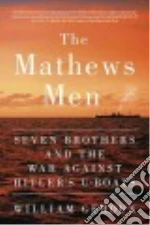 Title :
The Mathews Men
Title :
The Mathews MenAuthor: Geroux William Publisher: Viking Pr One of the last unheralded heroic stories of World War II: the U-boat assault off the American coast against the men of the U.S. Merchant Marine who were supplying the European war, and one community’s monumental contribution to that effort Mathews County, Virginia, is a remote outpost on the Chesapeake Bay with little to offer except unspoiled scenery—but it sent one of the largest concentrations of sea captains and U.S. merchant mariners of any community in America to fight in World War II.The Mathews Men tells that heroic story through the experiences of one extraordinary family whose seven sons (and their neighbors), U.S. merchant mariners all, suddenly found themselves squarely in the cross-hairs of the U-boats bearing down on the coastal United States in 1942. From the late 1930s to 1945, virtually all the fuel, food and munitions that sustained the Allies in Europe traveled not via the Navy but in merchant ships. After Pearl Harbor, those unprotected ships instantly became the U-boats’ prime targets. And they were easy targets—the Navy lacked the inclination or resources to defend them until the beginning of 1943. Hitler was determined that his U-boats should sink every American ship they could find, sometimes within sight of tourist beaches, and to kill as many mariners as possible, in order to frighten their shipmates into staying ashore. As the war progressed, men from Mathews sailed the North and South Atlantic, the Caribbean, the Gulf of Mexico, the Mediterranean, the Indian Ocean, and even the icy Barents Sea in the Arctic Circle, where they braved the dreaded Murmansk Run. Through their experiences we have eyewitnesses to every danger zone, in every kind of ship. Some died horrific deaths. Others fought to survive torpedo explosions, flaming oil slicks, storms, shark attacks, mine blasts, and harrowing lifeboat odysseys—only to ship out again on the next boat as soon as they'd returned to safety. The Mathews Men shows us the war far beyond traditional battlefields—often the U.S. merchant mariners’ life-and-death struggles took place just off the U.S. coast—but also takes us to the landing beaches at D-Day and to the Pacific. “When final victory is ours,” General Dwight D. Eisenhower had predicted, “there is no organization that will share its credit more deservedly than the Merchant Marine.” Here, finally, is the heroic story of those merchant seamen, recast as the human story of the men from Mathews. € 25,00
|
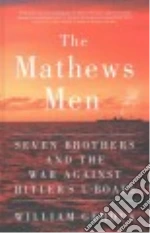 Title :
The Mathews Men
Title :
The Mathews MenAuthor: Geroux William Publisher: Thorndike Pr 'The German U-Boat war against American merchant men was deadly and dramatic--in World War II, the U.S. Merchant Marine had twice the fatality rate of the U.S. Navy. William Geroux has unearthed a fascinating tale of one small coastal town caught in the thick of the fight, and he tells it with a sharp reporter's eye and a real feel for the heroic men who went down to the sea in ships'--Provided by publisher. € 32,90
|
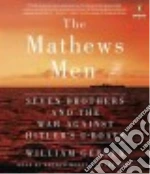 Title :
The Mathews Men (CD Audiobook)
Title :
The Mathews Men (CD Audiobook)Author: Geroux William, Morey Arthur (NRT) Publisher: Penguin Group USA € 40,60
|